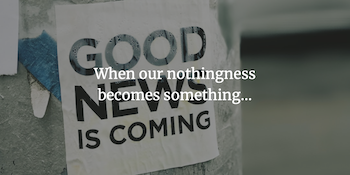
I have some good news for you. And it’s far better than an upcoming Fall Break, the Colts getting on a winning streak, or the IRS miscalculated your 2022 taxes, and they owe you $4,000. But before I give you the good news, I need to be honest and tell you some bad news first.
We live in a culture obsessed with self. The term “self-help” was first coined in a book with the same title in 1859 by Samuel Smiles, and it instantly became a bestseller. Alisa Childers points out that this is probably because the book was about everyone’s favorite subject: ourselves (Live Your Truth and Other Lies).
Self-help has become one of the most widely read genres. An entire self-help industry has become a billion-dollar enterprise (Schulz, “The Self in Self-Help,” New York, 01.04.13). It’s no wonder, then, that the self-esteem movement has gained major traction through Christian media outlets from the mid-twentieth century to today’s tweets, posts, memes, and snaps.
We have been conditioned to believe that if we just love ourselves more, everything will get better. You are enough. I am enough. We are enough. Just. As. We. Are. Enough!
In our self-saturated culture, pastors (including yours truly) can be a bit reluctant to use the word “sin” and convey the culturally contradictory thought that we are not enough; that outside of Jesus, we are actually dead in our sins (Ephesians 2:1).
We have a highly developed capacity for denial.
In a main-line church, the congregational confession spoken by all in a Sunday morning service began, “Our communication with Jesus tends to be too infrequent to experience the transformation in our lives You want us to have,” which seems less a prayer than a memo from one professional to another. Kathleen Norris writes, “At such times I picture God as a wily writing teacher who leans across a table and says, not at all gently, `Could you possibly be troubled to say what you mean?’ It would be refreshing to answer, simply, `I have sinned’” (Amazing Grace, 165).
The bad news, spiritually speaking, is a double entendre. First, we are not enough. We are sinners. That’s bad news all on its own. But if we can’t admit that, we’ll never find grace. We’ll never be set free from sin and death, which is more bad news added to the first bad news.
Norris goes on to say that people want grace and will admit to being “lost” and “blind” in John Newton’s fine old hymn. But don’t ask them to admit that it might take knowing oneself as a wretch to truly know grace for the wonder that it is…. “It seems to me that if you can’t ever admit to being a wretch, you haven’t been paying attention” (ibid., 167). Ouch.
Let’s not get sucked into the cultural vortex of anything centered on self. The good news that I promised to share earlier is this:
You are not enough … without Jesus.
When your life is surrendered to Him, He makes you enough, even more than enough, because the self, outside of Jesus, is like a chocolate bar without chocolate. Do the math: 0 + 0 = 0. The self plus the self still equals only the self. But 0 + 100 = 100. That zero is transformed from nothing to something, not because of any inherent value of its own number, but because of what is added to it. That which is added provides the value to that which is nothing on its own.
That’s the power of grace. Our nothingness and “not enough” becomes something and enough only because of the value of Jesus changing our lives. And that, my friends, is definitely good news.
“For I know that nothing good lives in me, that is, in my flesh…. What a wretched man I am! Who will rescue me from this body of death? Thanks be to God through Jesus Christ our Lord!”
(Romans 7:18, 25, CSB).
